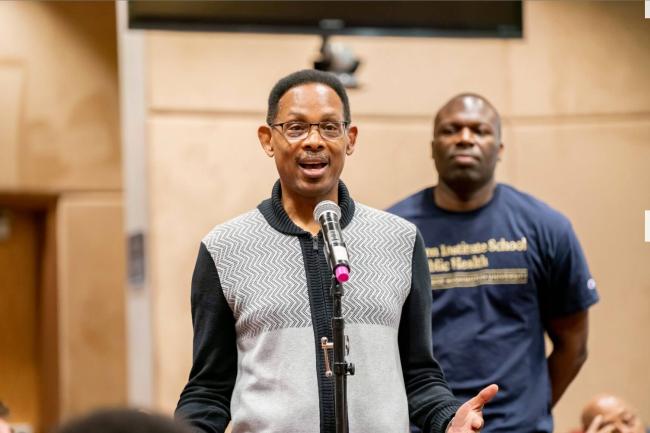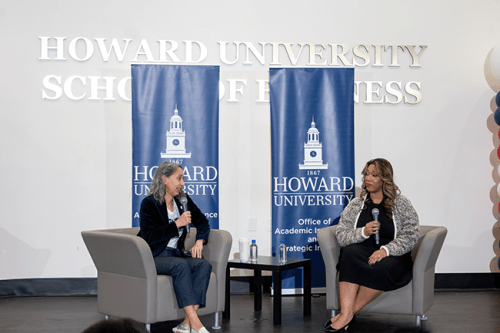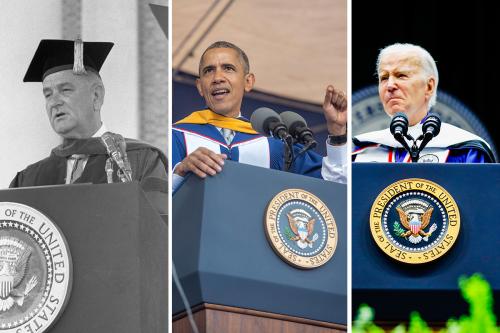WASHINGTON (June 18, 2019) – The Howard University Cancer Center’s first annual Men's Health Conference: From One Brother To Another A Conversation About Our Health brought together medical experts, program leaders, and men in the community for an insightful discussion on the stark realities of men’s health outcomes. On the eve of Father’s Day on June 15, conference speakers and panelists modeled vulnerability and transparency as they shared their own experiences with health and wellness. They also stressed the need for men to actively confront issues surrounding their health.
Howard University Provost Anthony Wutoh, Ph.D., opened the conference sharing lessons he’s learned as a man and a pharmacist. He acknowledged that most men, himself included, are resistant to seeing a physician and following through with treatment.
“One thing I want us to ask ourselves is, what is it for us as men that prevents us from seeking care?” Wutoh asked. “I had all of these things impacting my health and I would not go to the doctor, even when I could barely get out of bed. I thank the organizers of this conference because it really speaks to the urgent need for men to pay attention to our health.”
The conference highlighted trends in men’s health overall in terms of stigma, racial disparities, prevention, and treatment; and the issue of prostate health was a common thread throughout the discussion.
“In general, men just don’t talk about their health. There’s a men’s health gap where men have a shorter life expectancy than women,” said Pamela Coleman, MD, FACS, director of Men Take Ten and a respected urologist. “About 50% of these diseases are preventable and treatable, but there are some issues specific only to men and one is around prostate health.”
A panel of medical doctors provided remarks from a variety of perspectives. Doctors noted that the overall attitudes men have toward their own health is undermining their ability to prevent disease or lessen the effects of certain diseases. Oladunni Filani, MD, is an assistant professor in the Department of Community and Family Medicine at Howard University College of Medicine and attending physician at Howard University Hospital. He led the audience through an interactive survey about their own habits as it relates to health.
“As we can see, most of the men in this room are over 50 and what we find is that the older you get, the more concerned you tend to become with your health, but there are things men can and should do at every age,” said Filani. “I think it's essentially important that people take charge of their own health. You are the experts in your health, any physician that you see, can only guide you based on the information they provide. In the end, the information you know about your health will help you make the right decisions.”
Dr. Filani and the other expert panelists urged men in the audience to be champions of their own health. They implored the group to start with the basics like eating right, exercising and sleeping well as a base line for disease prevention and maintaining a healthy lifestyle. Doctors also stressed the need for routine medical examinations, developing an intimate relationship with your doctor and being in communication with them when health issues arise or persist, as well as regular screenings like the prostate exam.
Okey Enyia, MPH, is a doctoral student at George Washington University who attended the conference.
“It was great to be here at this event to get a sense of where the conversation is, and how we can better drive the conversation, not just in terms of health behaviors, but even more importantly, I think, in terms of structural barriers to health,” he said.
The afternoon ended with three Brother’s Keeper awards for leaders who have been instrumental to the Cancer Center’s efforts to increase awareness around prostate health through community education and outreach. Coleman received an award as director of the Men Take Ten program alongside Clinton Burnside, manager of the program, who is responsible for coordinating screenings and regularly interfaces with men in the community about their health. Rev. Willie F. Wilson also won an award for his continued leadership in the community and support of the annual Walk2Win The Fight Against Prostate Cancer 5k.
“Howard Thurman says it is suspicious to think that the god of religion is not also the god of life,” said Rev. Wilson. “That is to say that god is as equally concerned about your economic, social, political and yes, even your health welfare. I absolutely appreciate this award and the work that the Howard cancer center is doing.”
Men Take Ten is a program of the Howard University Cancer Center that provides educational material and prostate cancer screenings to men ages 40-75. For more information about the Men Take Ten program or to find information about upcoming prostate cancer screenings, visit cancer.howard.edu.
###
For media inquiries, contact Sholnn Freeman, Office of University Communications, sholnn.freeman@howard.edu
Photo credit: Oscar Merrida for Howard University.
About Howard University
Founded in 1867, Howard University is a private, research university that is comprised of 13 schools and colleges. Students pursue studies in more than 120 areas leading to undergraduate, graduate and professional degrees. The University operates with a commitment to Excellence in Truth and Service and has produced four Rhodes Scholars, 11 Truman Scholars, two Marshall Scholars, one Schwarzman Scholar, over 70 Fulbright Scholars and 22 Pickering Fellows. Howard also produces more on-campus African-American Ph.D. recipients than any other university in the United States. For more information on Howard University, visitwww.howard.edu.





